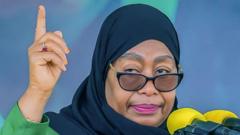Will Tanzania's President Deliver Justice for Election Protest Deaths?

Published: 2025-11-14 19:00:26 | Category: world
The recent unrest in Tanzania during the presidential election week has prompted President Samia Suluhu Hassan to announce an official investigation into the violent protests that erupted following her declaration as the winner with an overwhelming 98% of the vote. Accusations of severe human rights violations, including reports of killings, have sparked outrage among opposition leaders who label the election results a "mockery of democracy." In a surprising move, President Samia has requested leniency for those arrested, particularly young individuals caught in the turmoil.
Last updated: 11 October 2023 (BST)
What’s happening now
In the wake of the tumultuous election period, President Samia Suluhu Hassan's administration faces significant pressure to address the unrest that followed the electoral process. An official commission of inquiry has been established to investigate allegations of violent repression of protests. Meanwhile, the United Nations has urged Tanzanian authorities to ensure a thorough and transparent investigation into reported human rights abuses. The situation remains fluid as the government attempts to navigate the backlash from both domestic and international communities regarding the conduct of the elections and the subsequent response to protests.
Key takeaways
- President Samia has announced an investigation into the violent protests that followed the election.
- At least 240 individuals have been charged with treason, with calls for leniency being made.
- The UN has called for a transparent investigation into human rights violations during and after the elections.
Timeline: how we got here
The unrest during the election week can be traced back to a series of events leading up to the 29 October elections:
- 29 October 2023: Presidential elections held, results show President Samia winning with 98% of the vote.
- 30 October 2023: Protests erupt across the country in response to the election results.
- 31 October 2023: Reports of violence and human rights abuses emerge, with opposition claiming hundreds may have died.
- 1 November 2023: President Samia announces an official investigation into the unrest and calls for leniency for arrested individuals.
What’s new vs what’s known
New today/this week
In a recent parliamentary address, President Samia expressed her intention to investigate the unrest and has directed law enforcement to show compassion towards young individuals arrested during the protests. This marks a significant shift in her approach compared to the more stringent measures observed during the lead-up to the elections.
What was already established
Prior to the elections, the political landscape in Tanzania had been characterised by increasing tensions. The ruling party, Chama Cha Mapinduzi (CCM), was accused of systematically suppressing opposition, leading to the exclusion of key opposition figures from the electoral process. Reports of human rights abuses, including arrests and violence against opposition members, had already raised concerns about the fairness of the elections.
Impact for the UK
Consumers and households
The upheaval in Tanzania may have indirect implications for UK consumers and households, particularly those with ties to the region. If unrest persists, it could lead to economic instability, affecting trade relations and potentially increasing prices for goods imported from Tanzania.
Businesses and jobs
For UK businesses operating in or with Tanzania, the current political climate poses risks to supply chains and investment. Companies may need to reassess their operations in light of potential disruptions caused by ongoing civil unrest and government crackdowns.
Policy and regulation
The situation could prompt the UK government to review its foreign policy towards Tanzania, especially in terms of human rights advocacy and trade agreements. Increased scrutiny on Tanzania's political landscape may lead to calls for accountability from the international community.
Numbers that matter
- 98%: Percentage of votes reportedly received by President Samia in the recent election.
- 240: Number of individuals charged with treason following the protests.
- Hundreds: Estimated number of casualties as claimed by opposition sources during post-election unrest.
Definitions and jargon buster
- Treason: A crime that involves betraying one's country, typically by attempting to overthrow the government.
- Commission of inquiry: A body established by the government to investigate specific issues or events.
- CCM: Chama Cha Mapinduzi, the ruling political party in Tanzania.
How to think about the next steps
Near term (0–4 weeks)
In the immediate future, the focus will be on the commission of inquiry's findings and the government's response to any recommendations. Observers will be closely monitoring the treatment of those arrested during the protests and any potential shifts in government policy.
Medium term (1–6 months)
Should the inquiry reveal significant issues within the electoral process, the government may face increased domestic and international pressure to implement reforms. The effectiveness of President Samia's calls for dialogue with political parties will also be pivotal in shaping the political landscape in Tanzania.
Signals to watch
- Official statements from the commission of inquiry regarding its findings.
- Changes in government policies towards arrested individuals and political opposition.
- International responses, particularly from the UN and UK government, regarding human rights and electoral integrity.
Practical guidance
Do
- Stay informed about developments in Tanzania's political landscape.
- Monitor official communications from the government and opposition parties.
- Engage with advocacy groups focused on human rights in Tanzania.
Don’t
- Assume that the situation will stabilise without significant reforms.
- Overlook the potential for ongoing unrest and its implications for trade and relations.
- Ignore calls for accountability from international bodies.
Checklist
- Review your connections to Tanzania and potential impacts on business.
- Stay updated on human rights developments in the region.
- Consider supporting initiatives that promote democratic reforms in Tanzania.
Risks, caveats, and uncertainties
The situation in Tanzania remains volatile, and the full extent of the unrest's impact is not yet clear. The government's response to the commission's findings and the international community's reaction will be crucial in determining the trajectory of Tanzania's political stability. There is also the risk that calls for leniency may be met with resistance from factions within the government and ruling party.
Bottom line
The unrest following Tanzania's presidential elections highlights deep-rooted tensions within the country's political framework. As President Samia navigates this critical juncture, the path forward will require not only addressing the immediate aftermath of the protests but also committing to meaningful reforms that may restore public faith in the political process.
FAQs
What triggered the protests in Tanzania?
The protests were triggered by the announcement of President Samia's election victory with 98% of the vote, a result widely denounced by the opposition as undemocratic.
How many people were arrested during the unrest?
At least 240 individuals were charged with treason following the protests that erupted after the election results were announced.
What actions is President Samia taking in response to the unrest?
President Samia has announced an investigation into the unrest and has urged prosecutors to show leniency towards those arrested, particularly young people caught in the turmoil.



